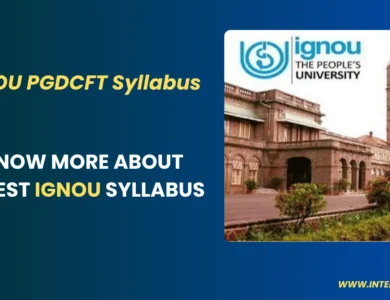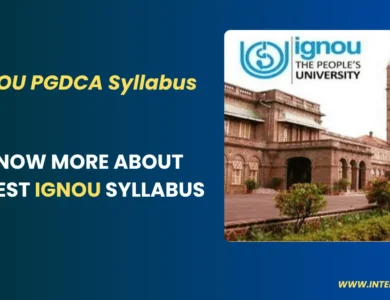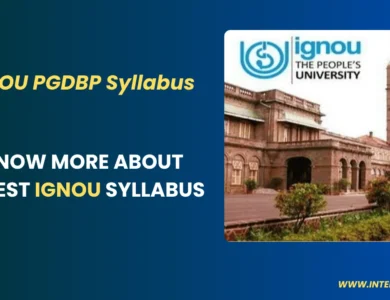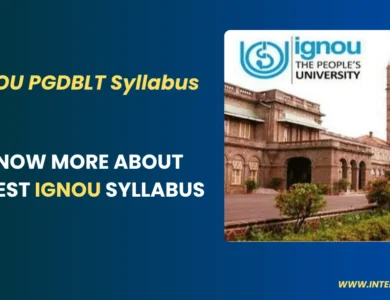IGNOU BCOM – BCOMG Syllabus 2025
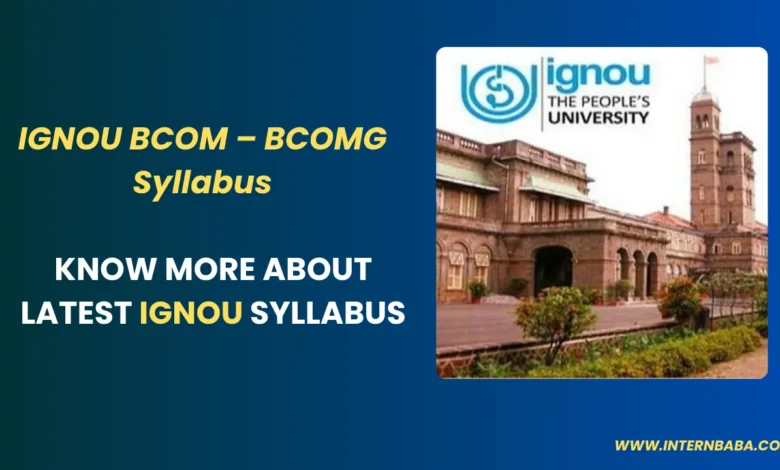
Planning to pursue a Bachelor of Commerce (BCom) from IGNOU in 2025? You’re making a smart and future-ready choice. IGNOU (Indira Gandhi National Open University) is India’s leading distance learning institution, well-known for providing accessible, affordable, and high-quality education across the country. If you’re a student looking for flexibility or a working professional aiming to upskill while continuing your job, IGNOU’s BCom program is tailored to suit your needs.
The BCom programme equips students with the fundamental knowledge of commerce, accounting, taxation, law, business practices, and finance. This guide offers a detailed breakdown of the IGNOU BCom Syllabus for 2025, covering its structure, subjects, credit distribution, and frequently asked questions. Whether you’re planning your academic year or just exploring options, this guide will help you understand what the BCom journey at IGNOU looks like.
Overview of IGNOU BCom Programme
| Programme Name | Bachelor of Commerce (BCom) |
|---|---|
| Programme Code | BCOMG |
| Duration | Minimum: 3 YearsMaximum: 6 Years |
| Eligibility | 10+2 or equivalent qualification |
| Medium of Instruction | English & Hindi |
| Total Credits Required | 132 |
The BCom programme under CBCS (Choice Based Credit System) enables students to select from a range of core, elective, and skill-based courses, ensuring a balanced mix of theoretical and practical knowledge.
IGNOU BCom Syllabus Structure (2025)
The IGNOU BCom syllabus is thoughtfully categorized into four distinct components:
- Core Courses (CC)
- Discipline Specific Electives (DSE)
- Ability Enhancement Compulsory Courses (AECC)
- Skill Enhancement Courses (SEC)
Let’s break down each section in detail.
1. Core Courses (CC) – 12 Courses (Total: 72 Credits)
These subjects form the backbone of the BCom programme. They cover essential topics in accounting, law, taxation, statistics, and more.
| Semester | Course Code | Course Title | Credits |
| 1 | BEGLA 135 | English in Daily Life | 6 |
| 1 | BCOS 183 | Computer Applications in Business | 4 |
| 1 | BCOC 131 | Financial Accounting | 6 |
| 2 | BCOC 132 | Business Organisation and Management | 6 |
| 2 | BHDC 131 | Hindi Bhasha aur Sampreshan | 6 |
| 2 | BCOS 184 | E-Commerce | 4 |
| 3 | BCOC 133 | Business Law | 6 |
| 3 | BCOC 134 | Business Mathematics and Statistics | 6 |
| 4 | BCOC 135 | Company Law | 6 |
| 4 | BCOC 136 | Income Tax Law and Practice | 6 |
| 5 | BCOC 137 | Corporate Accounting | 6 |
| 6 | BCOC 138 | Cost Accounting | 6 |
These courses are aimed at providing a strong foundation in commerce with both theoretical knowledge and analytical skills.
2. Discipline Specific Electives (DSE) – 4 Courses (Total: 24 Credits)
These elective subjects allow students to focus on specific areas of interest within commerce.
| Semester | Course Code | Course Title | Credits |
| 5 | BCOS 185 | Entrepreneurship | 6 |
| 5 | BCOS 186 | Management Accounting | 6 |
| 6 | BCOS 187 | Fundamentals of Financial Management | 6 |
| 6 | BCOS 188 | Auditing | 6 |
Students get exposure to management practices, financial control, and entrepreneurial skills crucial for business operations.
3. Ability Enhancement Compulsory Courses (AECC) – 2 Courses (Total: 8 Credits)
These courses are designed to improve soft skills and environmental responsibility.
| Semester | Course Code | Course Title | Credits |
| 1 | BEVAE 181 | Environmental Studies | 4 |
| 2 | BEGAE 182 | English Communication Skills | 4 |
Communication and environmental literacy are essential in any professional field today.
4. Skill Enhancement Courses (SEC) – 2 Courses (Total: 8 Credits)
Skill-based learning ensures practical knowledge and job readiness.
| Semester | Course Code | Course Title | Credits |
| 3 | BCOS 185 | Personal Selling and Salesmanship | 4 |
| 4 | BCOS 186 | Office Management and Secretarial Practice | 4 |
These subjects are especially helpful for students who plan to enter the workforce immediately after graduation.
Total Credit Summary
| Course Type | Number of Courses | Total Credits |
| Core Courses | 12 | 72 |
| Elective Courses | 4 | 24 |
| AECC | 2 | 8 |
| SEC | 2 | 8 |
| Total | 20 | 132 Credits |
Key Highlights of IGNOU BCom 2025
- UGC & Government Recognized: The degree is valid for further studies, public sector jobs, and private employment.
- Dual Medium: Choose between English and Hindi as your preferred medium of instruction.
- Budget-Friendly: IGNOU’s course fees are significantly lower than most regular universities.
- Flexible Learning: Study at your own pace with options for online materials, printed books, and video lectures.
- Job-Ready Skills: The course incorporates both theoretical and practical learning components.
Career Opportunities After IGNOU BCom
Upon completing your BCom from IGNOU, you can explore careers in:
- Accounting and Auditing
- Taxation
- Banking and Finance
- Business Administration
- Entrepreneurship
- Government and Competitive Exams
Additionally, this degree serves as a stepping stone for further studies like MCom, MBA, CA, CS, CMA, etc.
FAQs – IGNOU BCom Syllabus 2025
Q1. What is the duration of the IGNOU BCom course?
The minimum duration is 3 years, and the maximum is 6 years, offering students ample flexibility.
Q2. How many credits are required to complete the BCom program?
You must complete 132 credits spread across 20 courses to earn your degree.
Q3. Can I pursue IGNOU BCom in Hindi?
Yes. The course is available in both Hindi and English mediums, allowing students to choose based on their comfort.
Q4. Are there any practical components in the course?
Yes. Subjects like Computer Applications in Business and E-Commerce include practical elements, improving your hands-on skills.
Q5. Is the IGNOU BCom degree accepted for government jobs?
Absolutely. IGNOU is UGC-recognized, and its degrees are valid for both private and government sector jobs, including UPSC and banking exams.
This complete guide to the IGNOU BCom syllabus 2025 ensures you’re well-informed and prepared. With this structured program, IGNOU continues to support lifelong learning and career success. Make sure to bookmark this page and refer to it as you plan your academic path.


